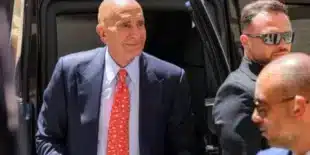U.S. mediator Amos Hochstein expressed optimism about ending the two-month-long Israel-Hezbollah conflict during his visit to Beirut on Tuesday. He stated that he returned to Beirut because he saw a significant chance to resolve the ongoing hostilities, which have persisted after nearly a year of clashes.
After meeting with Hezbollah-allied parliamentary speaker Nabih Berri, who has been leading the mediation efforts for Hezbollah, Hochstein emphasized the importance of taking advantage of this opportunity to conclude the conflict. He highlighted that the decision ultimately lies with the involved parties and noted that the chance to end the conflict is now within reach. Hochstein urged for a decisive outcome in the coming days.
Hochstein described his meeting with Berri as “very constructive and very helpful,” and mentioned that recent discussions have successfully narrowed the differences between the parties. He declined to take questions from reporters, stating his preference to avoid negotiating through the media.
Sources later told Al-Arabiya television that Hezbollah leader Sheikh Naim Qassem’s speech was postponed because the Berri-Hochstein meeting did not meet expectations. The meeting failed to address key issues, particularly the clause regarding the right to self-defense.
Despite this, LBCI television reported a positive atmosphere in Ain el-Tineh following the meeting with Hochstein, describing the talks as useful and optimistic.
Hochstein also met with caretaker Prime Minister Najib Mikati. The United States and France have been leading efforts to establish a ceasefire in the Israel-Hezbollah war.
A Lebanese official informed AFP on Monday that the government viewed a U.S. truce proposal positively. Another official stated that Lebanon was awaiting Hochstein’s arrival to review unresolved points.
On Monday, U.S. State Department spokesperson Matthew Miller mentioned that Washington had been sharing proposals with Lebanon and Israel, and both had responded to the plan. Miller emphasized the U.S.’s push for the full implementation of U.N. Security Council Resolution 1701, which ended the 2006 Israel-Hezbollah war. This resolution requires all armed forces, except the Lebanese army and U.N. peacekeepers, to withdraw from the Lebanese side of the border with Israel, and also mandates the withdrawal of Israeli troops from Lebanon.


